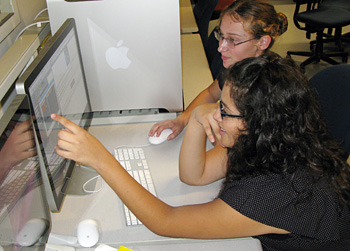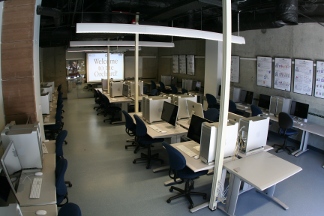
Fall 2009 students pair programming in Scratch.

Our labs are held in the Apple Orchard, which is not only the newest lab on campus with the fastest machines, but also has the most natural light!
CS10: The Beauty and Joy of Computing, is an exciting new course offered by the UC Berkeley EECS Department. Computing has changed the world in profound ways. It has opened up wonderful new ways for people to connect, design, research, play, create, and express themselves. However, just using a computer is only a small part of the picture. The real transformative and empowering experience comes when one learns how to program the computer, to translate ideas into code. This course will teach students how to do exactly that, using Snap! (based on Scratch), one of the friendliest programming languages ever invented. It's purely graphical, which means programming involves simply dragging blocks around, and building bigger blocks out of smaller blocks.
But this course is far more than just learning to program. We'll focus on some of the "Big Ideas" of computing, such as abstraction, design, recursion, concurrency, simulations, and the limits of computation. We'll show some beautiful applications of computing that have changed the world, talk about the history of computing, and where it will go in the future. Throughout the course, relevance will be emphasized: relevance to the student and to society. As an example, the final project will be completely of the students' choosing, on a topic most interesting to them. The overarching theme is to expose students to the beauty and joy of computing. This course is designed for computing non-majors, although interested majors are certainly welcome to take the class as well! We are especially excited about bringing computing (through this course) to traditionally under-represented groups in computing, i.e., women and ethnic minorities.
Some context: in the Fall of 2009, we piloted a 2-unit version of this course as the freshman/sophomore seminar CS39N: The Beauty and Joy of Computing to 20 students. It was such a success that we decided to move ahead to make this course our new computing course for non-majors, replacing the venerable CS3L and CS3S . Since then, this has been one of the most popular courses in EECS. Don't believe us? See for yourself! We're continuing to grow the course as word spreads to more students. We're continually replacing the weakest parts of the curriculum and hope you'll enjoy!
We will be using Pair Programming, described best by Laurie Williams, a computer science professor at North Carolina State University: "Two programmers working side-by-side, collaborating on the same design, algorithm, code or test. One programmer, the driver, has control of the keyboard/mouse and actively implements the program. The other programmer, the observer, continuously observes the work of the driver to identify tactical (syntactic, spelling, etc.) defects and also thinks strategically about the direction of the work. On demand, the two programmers can brainstorm any challenging problem. Because the two programmers periodically switch roles, they work together as equals to develop software."
For the most part, we would prefer to teach this course without grades. What a wonderful concept, learning for learning sake! However, even though we can't change the "system" overnight, we can create grading policies that support learning as much as possible. The various course activities will contribute to your grade as follows:
| Activity | Points | Percent of Total Grade |
|---|---|---|
| Weekly Reading Quizzes | 20 | 4% |
| Lab Check-Offs | 30 | 6% |
| Homework 1 (Word Guessing) | 10 | 2% |
| Homework 2 (Encryptify) | 20 | 4% |
| Homework 3 (2048) | 30 | 6% |
| Midterm Project | 75 | 15% |
| Innovation Blog | 40 | 8% |
| Final Programming Project | 75 | 15% |
| Quest | 25 | 5% |
| Midterm | 75 | 15% |
| Final Exam | 100 | 20% |
| Total Points | 500 | 100% |
Your letter grade will be determined by total course points, as shown in the table below. Incomplete grades will be granted only for dire medical or personal emergencies that cause you to miss the final exam, and only if your work up to that point is satisfactory.
| Points | Grade |
|---|---|
| 485-500 | A+ |
| 460-484 | A |
| 450-459 | A- |
| 440-449 | B+ |
| 420-439 | B |
| 400-419 | B- |
| 375-399 | C+ |
| 360-374 | C |
| 350-359 | C- |
| 300-349 | D |
| < 299 | F |